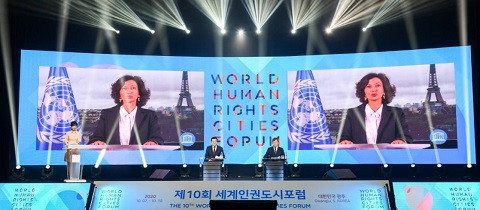
GCED Basic Search Form
Quick Search
Vous êtes ici
Nouvelles

In deploring racial discrimination, the participants at the recently concluded 10th World Human Rights Cities Forum held in the South Korean City of Gwangju adopted a declaration “affirming a global-level solidarity for inclusion with the full understanding that the history of racial discrimination is a disease that obstacles coexistence and mutual benefit of human community”. The declaration also acknowledged the “significant role of women and youth as leaders and agents of change in confronting the COVID-19 crisis through their relentless efforts in building communities through sharing and engagement, both in urban and rural areas.” The issue of racism and discriminations became a major theme that resonated throughout the forum – an unequivocal expression of both the long-standing and contemporary challenges facing human rights in the 21st century.
For the first time, UNESCO co-hosted the tenth edition of the Forum from 7 to 10 October 2020. With the theme: “The Future of Human Rights Cities: Local Memories and Global Sharing” the forum shed light on key areas such as the localization of Sustainable Development Goals; the defence and protection of human rights at the local level; and the fostering of inter-city cooperation.
The Gwangju Metropolitan City has hosted the Forum since 2011 and, in this regard, has served as a focal meeting point for human rights cities and global social movements ever since, as it welcomed human rights experts and participants from around the world. The Forum comprised 35 panel discussions, with around 2,780 participants, including mayors, city officials and experts from 253 cities representing 76 countries.
Cities… are true microcosms, places of all possibilities, of all encounters, of all creations… cities are exceptional laboratories, and places where the future is invented – like the citizens of Gwangju demonstrated when they rose up on 18 May 1980.
-- Audrey Azoulay, UNESCO Director-General; Speech during the Opening Ceremony
We can move forward from this pandemic to build the “next new normal” that will be better if we take the right decisions and if we prioritize again, the vulnerable groups. It is through this partnership towards our common goal of inclusive urban governance that the best interest of humankind will be served.
-- Gabriela Ramos, UNESCO Assistant Director-General for Social and Human Sciences
There is no better time than now for us to act collectively, retrospectively and most significantly, prospectively to secure our desired future in the post-COVID.
-- Ângela Melo, UNESCO Director for Policies and Programmes, Social and Human Sciences Sector
UNESCO hosted the roundtable meeting of the ICCAR Global Steering Committee (GSC), where a review of the Ten-Point Plans of Action was conducted in line with the global agendas on gender equality, intersectionality and human mobility. It especially underlined the issue of racism and discriminations, as manifested around the world, through the reviewed Ten-Point Plans of Action presented by the different coalitions during the meeting.
In this regard, the Coalition of Arab Cities against Racism, Discrimination, Xenophobia and Intolerance expressed how they are “Concerned about the escalation of racism in all its forms and sources against some groups of citizens and inhabitants of Arab cities, and refusing those practices that represent a real threat to equality, peace, security and social cohesion.”
The U.S. Coalition of Cities against Racism and Discrimination, further emphasized the complexity and magnitude of the issue noting that, “The most glaring and persistent of our entrenched problems is racism, a complex, self-defeating system of beliefs and behaviours grounded in the presumed superiority of the white race.”
The Coalition of Inclusive Municipalities emphasized the importance of participatory and inclusive action in addressing the issue, expressing a commitment rooted in a concept, “Nothing for us without us: Ensuring that citizens of all ages have a voice in anti-racism initiatives and decision-making spaces.”
The Asia-Pacific Coalition of Cities Against Discrimination, led by the City of Gwangju, discussed their Principles of Action, highlighting the need to “Promote equity, social justice, and shared prosperity in the city practices.” This was strengthened by a concrete commitment to “Develop targeted initiatives to address discrimination and promote equal opportunities.”
The UNESCO Master Class Series against Racism and Discriminations was presented at the International Human Rights Education Center Workshop held in the Forum, together with the presentation of other human rights education projects. The Masterclass series seeks to empower students to become youth champions in their own schools and communities and to spread awareness on how to deconstruct the mechanisms underlying racism and discriminations. It was launched by UNESCO in 2019.
- The Declaration of the 10th World Human Rights Cities Forum (WHRCF)
- Photo gallery
- International Coalition of Inclusive and Sustainable Cities − ICCAR
URL:
